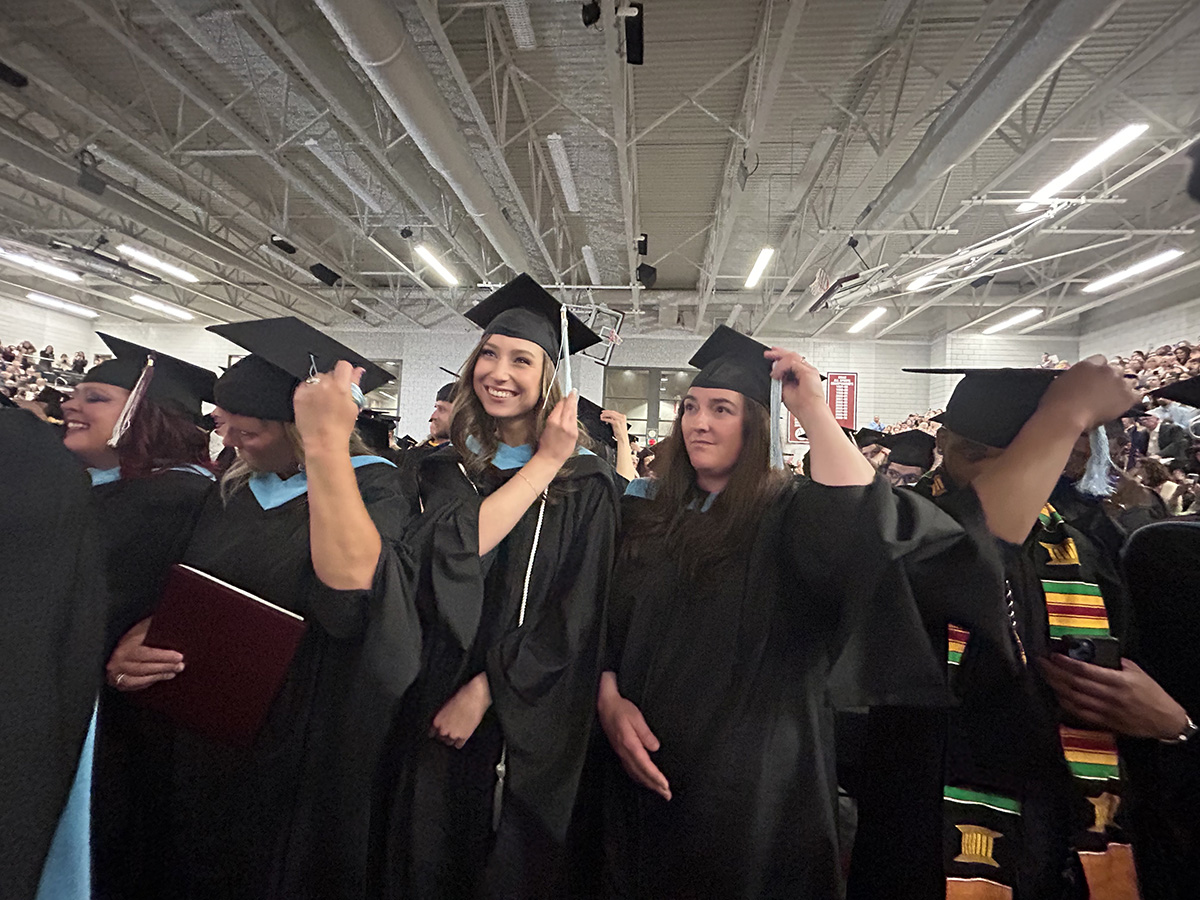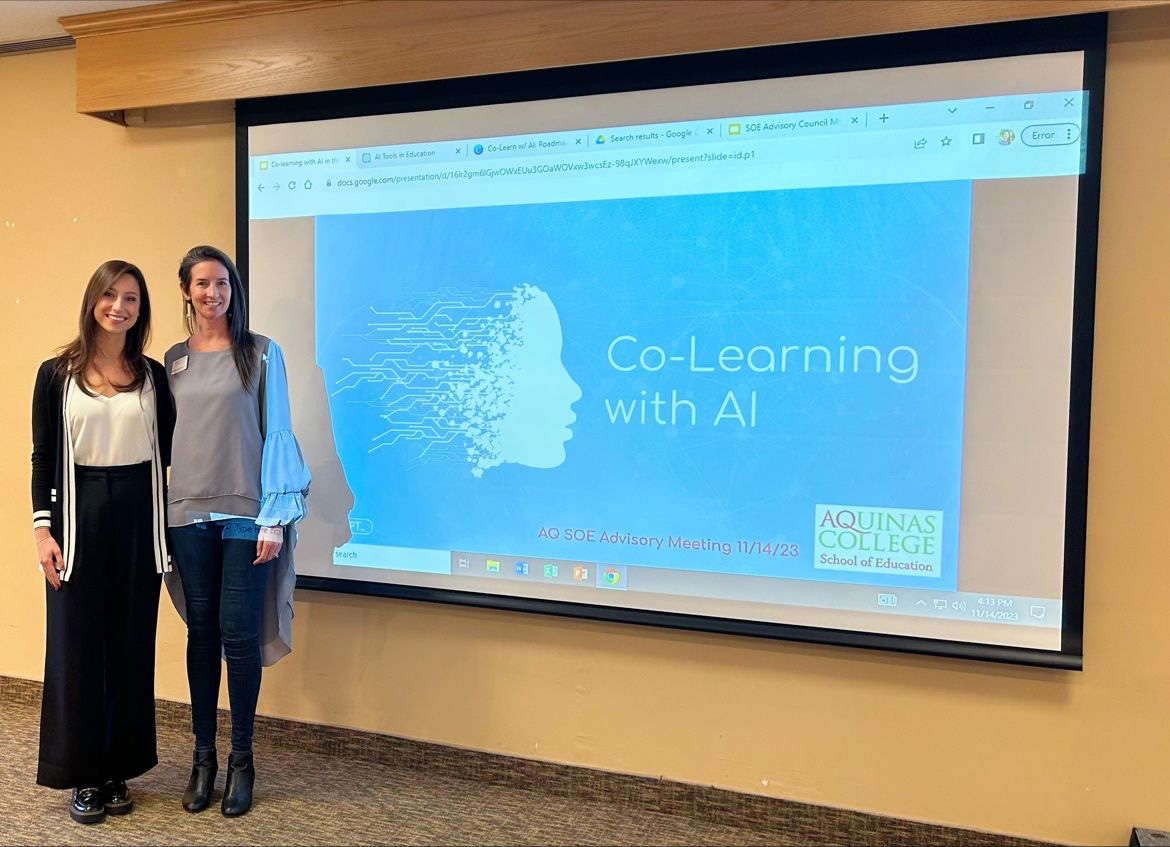Not every teacher gets to return to the high school where they graduated. But for Ingrid Vredevoogd, who earned her Accelerated Master in Education (AME) at AQ this past spring, returning to Grandville to teach felt like returning home.
Eager to share her inspiring journey, Ingrid reflects on how her recent graduation from Aquinas with her AME degree has given her the skills, expertise and connections needed to return to the Grandville community.
From Coaching Camps to Creating Classroom Curriculums
Ingrid’s inspiration for teaching stemmed from the coaching work she did while attending Grandville High School. Between coaching cheerleading and volunteering at kids camps, she grew to love being a source of leadership and guidance for elementary and middle school girls. She explains, “When it came time for me to pick a major and everything in college, that was my source of inspiration. I enjoyed seeing kids progress and how natural it felt to have fun in that space.”
Ingrid’s college career began at Michigan State University; however, she wanted to be closer to her family and transferred to Aquinas after her first three years. She moved back to Grand Rapids and was immediately welcomed into the AQ community. “My sister was on the soccer team starting the same year that I transferred,” Ingrid shares. “I had that connection and met a lot of people through her and my classes. I had Sister Justine Kane right away, Dr. Boutelier and other great people who are still in my life and support me in the education field today. I felt very welcomed and a part of the conversation.”
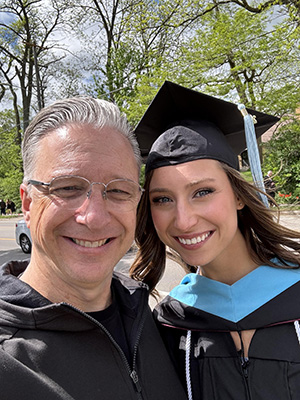 After three years at Michigan State, she found herself at a crossroads: only some
of her credits could transfer to Aquinas. Determined to make it work, she spoke to
Dr. Susan English, who advised her to finish her ESL minor in her senior year. Ingrid
pushed forward and took the 30 credits that would allow her to graduate from AQ with
this minor and her general education degree.
After three years at Michigan State, she found herself at a crossroads: only some
of her credits could transfer to Aquinas. Determined to make it work, she spoke to
Dr. Susan English, who advised her to finish her ESL minor in her senior year. Ingrid
pushed forward and took the 30 credits that would allow her to graduate from AQ with
this minor and her general education degree.
Because of her unique circumstances, she bypassed the student teaching part of her degree and didn’t receive her teaching certificate when she finished. Despite this hurdle, she made excellent connections during her time at Aquinas that led her to her first role as an English teacher at San Juan Diego Academy. She taught there for two years while she took her AME classes. “I had done some observation hours and tutoring there for my ESL minor,” explains Ingrid. “One unique thing about the school is that, at the time, they had three homeroom teachers: one for sixth, one for seventh, one for eighth. Each homeroom teacher taught either history, science, or math and rotated the kids around. But, there was no English-focused teacher.” The teachers for the other three courses simply taught English on top of their other subjects.
This gave Ingrid the opportunity to step into a new role the school created for an English-focused middle school teacher, alleviating the language arts subject from the other middle school homeroom teachers. With the help of the school’s existing textbooks, unit and curriculum design classes at AQ and 1:1 support from her professors, Ingrid was able to flesh out an entirely new curriculum for the middle schoolers.
"Honestly, looking back, it was a very busy year for me when considering the needs of the sixth, seventh and eighth graders," Ingrid states. "I was honored to contribute to the school and am grateful for all that its staff and students taught me. I always dreamed of returning to Grandville to teach, so when the opportunity arose, I knew I had to jump at it, although it was hard saying goodbye to my SJDA family. My teaching career has been a wild start in all the best ways."
Pioneering Policy and Publication in the Age of AI
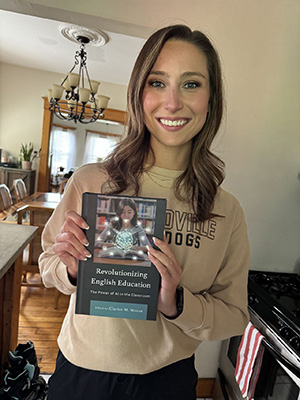
Ingrid had a close working relationship with Dr. Stefani Boutelier in the AME program, so when a publication opportunity came up, Dr. Boutelier immediately contacted Ingrid.
The two wrote a chapter on co-learning with AI, examining how AI can serve as a thought partner and tool for teachers. After their proposal was approved, they spent the rest of the summer of 2023 writing, and the chapter was eventually published. The book is now available on Amazon.
“I am just so appreciative of Dr. Boutelier for involving me in this opportunity. Having this on my resume really opens up doors for the future,” states Ingrid. “We’ll be presenting with a group of other professors who also contributed chapters to the book at the National Council of Teachers of English Annual Conference in November, in Boston. I’m super excited. I believe Brianna Asmus, another professor I had during my ESL program who I adored – like every teacher I had at Aquinas – will also be there. It’s going to be great, and I’m really looking forward to it.”
As a 10th-grade English teacher at Grandville High School, Ingrid doesn’t just encounter AI in theory. She is also among the first to determine how AI will be implemented in the classroom.
Her district formed a team to trailblaze this implementation and invited her to help write the policy language for their handbooks so that students and teachers better understand the expectations.
“I think it’s interesting to be in the school setting right now, surrounded by teachers who are just beginning to learn about AI and how it can be used. Even though AI is still a bit like the Wild West, I’m grateful to be in a district that is learning, growing and considering how it can be used effectively,” Ingrid shares. “Many students and people, in general, see AI as a way to cheat or do the thinking for you, but I believe if we can change that mindset and help people see AI as a partner instead of a substitute, it can lead to a better future."
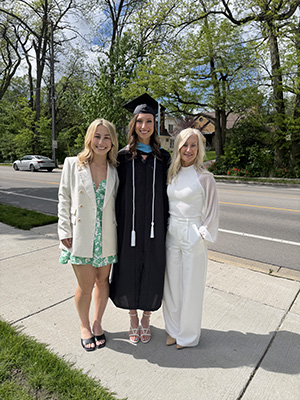 Combining Classic Composition with Cutting-Edge AI
Combining Classic Composition with Cutting-Edge AI
Ingrid currently teaches two sections of American literature, two sections of creative writing and one section of debate. She encourages her students to integrate AI into the later stages of their writing processes instead of simply plugging the prompt into their computers and letting it write the essay for them.
This year, Ingrid is introducing a new writing process where students will use a writer’s notebook in a binder to draft their work by hand before transferring it to the computer. This approach emphasizes the step-by-step nature of writing and ensures that initial ideas are the students’ own. Afterward, students will use AI tools to assist with the revision process, focusing on tools that provide feedback and explanations to help them understand the revisions, rather than doing the work for them.
On the teaching side, Ingrid also explains how she uses AI to help generate lesson plans. According to Ingrid, “You could plug in a standard from the common core and say, ‘Hey, I have 45 minutes. What are some ways that I could teach this standard?’ I have done that a couple of times, and it can spell out some ground-level ideas that apply to what I’m teaching. When you think of the time saving, it’s incredible what it can do and how quickly it can do it.”
Reflecting on her experiences, Ingrid expresses a deep gratitude for the opportunities that shaped her path.
She shared how working as a part of the Diocese of Grand Rapids in partnership with Aquinas’ AME program granted her a large tuition discount. “If I had stayed at Michigan State, I would have been paying full price for classes during a full year that I wouldn't be paid as a student teacher, compared to working as a teacher and receiving 50% off my tuition. It was such a blessing that it worked out that way financially on top of everything else.”
“Overall, I'm just very grateful for the educational journey that brought me to where
I'm at and for the educators who helped me to figure out this world and support students,”
Ingrid shares. “I’m excited to see how I can impact students and support teachers.
I'm grateful for Aquinas and all that it opened for me. I mean, I've graduated now
and still have connections and doors open because of Aquinas. It's a special place.” 